Empty Venues
I imagine nothing is more dispiriting to Olympic athletes than competing in practically empty venues. Hell, even I find it dispiriting just watching on TV.
 Unfortunately, this has become a quadrennial farce. Ironically, it originated at Beijing 2008, when empty seats betrayed all of the hype China had propagated about national interest in those Games. Frankly, I was stupefied that its totalitarian regime did not ensure one of its 1.3 billion butts was firmly planted in every seat at every venue for every event.
Unfortunately, this has become a quadrennial farce. Ironically, it originated at Beijing 2008, when empty seats betrayed all of the hype China had propagated about national interest in those Games. Frankly, I was stupefied that its totalitarian regime did not ensure one of its 1.3 billion butts was firmly planted in every seat at every venue for every event.
But, given that embarrassing Chinese precedent, I was even more stupefied that organizers of London 2012 allowed the eyesore of empty seats to undermine the optics of success.
It’s not as if organizers were not aware that this might be the case. It boggles the mind, therefore, that they did not enlist tens of thousands of volunteers (from pensioners to school kids) to show up at a moment’s notice to fill seats if ticket holders do not show up. They could have warned in print on all tickets that the holder forfeits the seat if it is not occupied by 15 minutes before the scheduled start of the event.
(“London Olympics: Day 1,” The iPINIONS Journal, July 28, 2012)
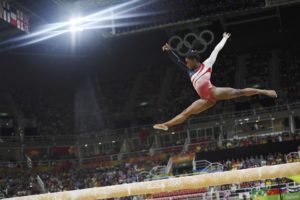 As it happens, I posited in my Day 1 commentary that organizers of Rio 2016 might do a better job. I am now convinced they will not.
As it happens, I posited in my Day 1 commentary that organizers of Rio 2016 might do a better job. I am now convinced they will not.
For example, since Beijing, women’s gymnastics have ranked in popularity only behind swimming events featuring Michael Phelps and running events featuring Usain Bolt. Yet, watching the Women’s Team final last night, the stands were so empty you’d be forgiven for thinking it was a closed practice round – open only to coaches and family members.
In fact, empty seats have become so dispiriting, no less an athlete than Bolt has taken to social media to plead with fans to get tickets for Track and Field events, which begin on Friday.
Tennis
It hardly made news when Venus Williams of the USA lost in the first round. After all, you could count on one hand the number of times she advanced beyond the early rounds in any major tournament in recent years.
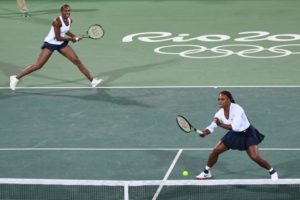 But it was truly “breaking news” when a) her sister Serena lost in the second round; b) the Williams sisters lost in the first round in doubles; and c) Novak Djokovic of Serbia lost in the first round.
But it was truly “breaking news” when a) her sister Serena lost in the second round; b) the Williams sisters lost in the first round in doubles; and c) Novak Djokovic of Serbia lost in the first round.
After all, coming off singles and doubles victories at Wimbledon just weeks ago, Serena was the prohibitive favorite not only to win singles gold, but carry her sister to doubles gold to boot. And, granted, Djokovic came into these Games in a bit of a slump, after losing in the early rounds at Wimbledon. But he’s still the reigning No. 1 player in the world, having won the French Open and Australian Open earlier this year.
Enough said:
I appreciate inquiries about why I’m not commenting on the way the USA men and women’s Basketball teams are routing their opponents. But, truth be told, I simply cannot get too excited about sports like Basketball and Tennis at the Olympics that enjoy perennial popularity. In fact, I rather like the Olympian reordering of things, which sees sports like Swimming and Track and Field getting the media attention that is usually lavished on big-time professional sports.
(“London Olympics: Day 6,” August 2, 2012)
Swimming
Tonight’s featured event was the Men’s 100m Freestyle. The winner of this race can fairly claim to be the fastest swimmer in the world.
This, notwithstanding the Men’s 50m Freestyle, which should not even be an Olympic event. The four strokes and medleys thereof already give swimmers an unfair advantage when it comes to opportunities to win Olympic medals – as Michael Phelps can readily attest. There’s no 50m Sprint in Track and Field, for example.
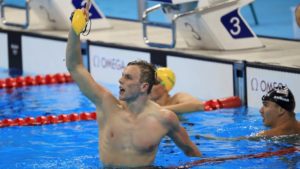 The point is that the fastest runner has always been the most celebrated athlete in Track and Field. And the fastest swimmer used to be the most celebrated in this sport.
The point is that the fastest runner has always been the most celebrated athlete in Track and Field. And the fastest swimmer used to be the most celebrated in this sport.
But Phelps’s unprecedented haul of medals in other events has given him such unparalleled celebrity, most people probably think he’s the fastest swimmer in the world; whereas he has never even competed in the Men’s 100m Freestyle at any Olympic Games.
- Kyle Chalmers of Australia won gold in 47:58; Pieter Timmers of Belgium, silver; Nathan Adrian of the USA, bronze.
Rowing
Poor Brazil, it can’t catch a break.
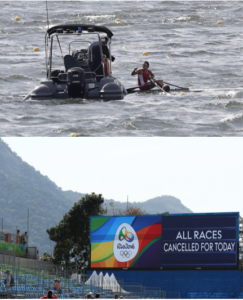 Before these Games began, you would’ve been hard-pressed to find a single commentator who did not express some foreboding over Zika, political chaos, terrorism, and/or sewage-infested waterways.
Before these Games began, you would’ve been hard-pressed to find a single commentator who did not express some foreboding over Zika, political chaos, terrorism, and/or sewage-infested waterways.
Of course, similar concerns precede every Olympics, and they invariably prove unwarranted. They are proving so in Rio too – just as I predicted in “Political Chaos In Brazil Makes Zika Virus Least of Pre-Olympic Woes,” April 8, 2016. Hell, even the clear blue waters of the Diving pool mysteriously turning swampy green did not disrupt competition….
But nobody anticipated Mother Nature pissing and passing wind with such fury that would make rowing impossible. Specifically, it turned what should have been flat, glistening waterways into white-water rapids.
This forced organizers to cancel a full day of competition on Day 2 and again today. Yet they insist the medal rounds will begin tomorrow as scheduled … come what may?
Fencing
Chances are that the only thing you’ve heard or seen about Fencing was from NBC profiles of black female fencer Ibtihaj Muhammad of the USA. And, based on the ones I’ve seen, those profiles invariably focus more on her religious garb than fencing skill. Therefore, I suppose it’s fitting that she lost in the early rounds of Women’s Sabre Individual.
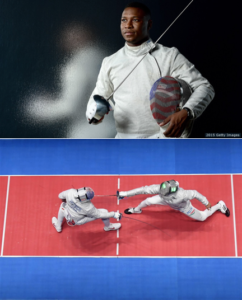 Meanwhile, you’ve probably never heard of black male fencer Daryl Homer of the USA. Not least because NBC has given him less than ten percent of the coverage it has lavished on Muhammad. Perhaps things would be different if Homer were a Sikh who competes in a turban, the way Muhammad competes in a hijab….
Meanwhile, you’ve probably never heard of black male fencer Daryl Homer of the USA. Not least because NBC has given him less than ten percent of the coverage it has lavished on Muhammad. Perhaps things would be different if Homer were a Sikh who competes in a turban, the way Muhammad competes in a hijab….
More to the point, though, while the media had cameras trained on Muhammad’s early loss, Homer was winning round after round in virtual obscurity. He reached the gold medal round in Men’s Sabre Individual tonight.
I was really rooting for him. Unfortunately, he lost to the defending Olympic champion.
- Aron Szilagyi of Hungary won gold; Daryl Homer of the USA, silver; and Kim Junghwan of the Republic of Korea, bronze.
All the same, Homer’s silver represents the first Olympic medal any American has won in this sport since 1984.
MEDAL COUNT: USA – 32; China – 23; Japan – 18
Related commentaries:
London Day 1…
London Day 6…
Pre-Olympic woes…